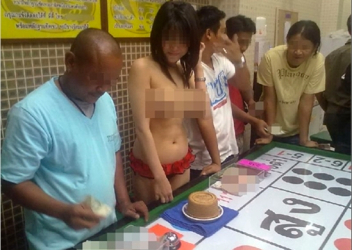 Last weekend, Bangkok’s Metropolitan Police raided an alleged gambling den in the city’s Sai Mai district after photos (including this one on the right) and video of topless girls apparently working as casino dealers and/or hostesses hit the Thai interwebz. But the police raid found only an abandoned warehouse mysteriously fitted out with a dozen surveillance cameras.
Last weekend, Bangkok’s Metropolitan Police raided an alleged gambling den in the city’s Sai Mai district after photos (including this one on the right) and video of topless girls apparently working as casino dealers and/or hostesses hit the Thai interwebz. But the police raid found only an abandoned warehouse mysteriously fitted out with a dozen surveillance cameras.
The Sai Mai police superintendent claimed that the pictures had been taken at a one-off casino night during the Dec. 31 New Year celebrations. The super also complained to the Bangkok Post that all the whispering about why a casino was operating right under his nose had really pissed him off. “The photographs of the topless girls have ruined my image even though I have worked hard for years.” (Ruined by photos of topless girls? You just described most of our adolescence.)
A few days after the raid, the den’s owner turned himself into the police, along with several people depicted in the photos: the high-low gambling host, one of the gamblers, and the two models. The owner confirmed that the photos were of a temporary New Year’s gambling den, but helpfully added that he’d since started building a permanent one. The girls (aged 27 and 30) claimed they’d been hired to do what the TAN Network referred to as “model walks,” but agreed to gamblers’ requests to show a little more skin in exchange for tips. The girls were each fined 500 baht for committing an obscene act, the three men face gambling-related charges and the poor police superintendent has been asked to conduct a review of the incident.
In Malaysia, police launched midnight raids on three ‘cyber cafes’ in Georgetown, detaining 11 individuals and 54 computers that had been (in Bernama’s words) “modified for gambling purpose”. A few days earlier in the Malaysian state of Johor, police netted 252 computers and slot machines plus 66 individuals (including patrons, mostly foreigners) from nine premises. The New Straits Times quoted the Batu Pahat police chief as saying operators were shifting activity away from cities to more rural areas “but we are aware of their tactics because of our monitoring and intelligence.” The maximum sentence operators face is RM100k (US $33k) per gaming device or five years in jail or both.
 In the Philippines, sabong (cockfighting) is the third favorite form of betting among men, more popular than bingo or even the ubiquitous numbers game jueteng. So it’s not a great surprise that the Philippine Amusement and Gaming Corporation (Pagcor) is openly musing about showing cockfight broadcasts in its self-run casinos. The Inquirer quoted Pagcor CEO Cristino Naguiat telling the Senate committee on Games, Amusement and Sports that although he’d yet to receive any proposals, there had been “talks” about the concept. Pagcor VP and legal services head Jay Santiago predicted there would be “no protest” provided all the legal requirements are met.
In the Philippines, sabong (cockfighting) is the third favorite form of betting among men, more popular than bingo or even the ubiquitous numbers game jueteng. So it’s not a great surprise that the Philippine Amusement and Gaming Corporation (Pagcor) is openly musing about showing cockfight broadcasts in its self-run casinos. The Inquirer quoted Pagcor CEO Cristino Naguiat telling the Senate committee on Games, Amusement and Sports that although he’d yet to receive any proposals, there had been “talks” about the concept. Pagcor VP and legal services head Jay Santiago predicted there would be “no protest” provided all the legal requirements are met.
CLSA Philippines analyst Leo Venezuela suggested to Gambling Compliance that the cockfight broadcasts would not be made available in the new Pagcor Entertainment City casinos in Manila Bay, as “opposition from animal rights activists” wouldn’t sit well with the licensees. With new competition opening up in Manila, and cockfighting more popular in rural areas, Venezuela theorized that Pagcor could be using it as a brand differentiator. Pagcor previously broadcast cockfighting via Tele-Sabong at its PhilWeb betting stations. Frankly, we don’t get the appeal, especially since spectators face the very real possibility of death, plus nightmares like the one below…
